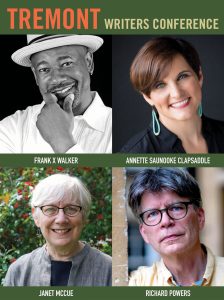
Annette Saunooke Clapsaddle and Richard Powers live on opposite sides of Great Smoky Mountains National Park. Soon, the two award-winning novelists will converge in the mountains to help create the first-ever conference for writers held within the national park boundary.

The inaugural Tremont Writers Conference is the coordinated effort of two educational park partners, Great Smoky Mountains Institute at Tremont and Great Smoky Mountains Association. Set on the lush, secluded Tremont campus, the event will immerse a small group of selected writers in an intensive retreat of brainstorming and fine-tuning their work while learning about nature and writing in small groups from Wednesday, October 25, through Sunday, October 29.
Clapsaddle lives in Cherokee, North Carolina, and became the first enrolled citizen of the Eastern Band of Cherokee Indians to publish a novel with the release of Even As We Breathe, which was a finalist for the Weatherford Award, one of NPR’s Best Books of 2020, and winner of the 2021 Thomas Wolfe Memorial Literary Award.
“Much of my writing is directly influenced by the natural spaces of my home,” she said. “Tremont will offer the opportunity to share that influence with participants while also learning from them and the other instructors.”
One of three author workshop leaders at the conference, Clapsaddle will work closely with Frank X. Walker, the first African American Kentucky poet laureate, and nonfiction writer Janet McCue, who co-authored Back of Beyond: A Horace Kephart Biography with naturalist George Ellison, winning the 2019 Thomas Wolfe Memorial Literary Award.
Far from Cherokee on the other side of the park, Powers lives near Tremont in Townsend, Tennessee. A MacArthur Fellow and Pulitzer Prize-winner in fiction, he will lead sessions for the entire group, including a craft talk on the final night of the conference that will be held at Maryville College and open to the public.
“I’ve taught and worked with writers in many places around the world, but I’ve never taken part in a writers conference within earshot of a rushing mountain stream and just beneath a spectacular waterfall,” he said. “I will enjoy the chance to talk about fiction in the middle of a biodiverse forest in one of America’s greatest national parks.”

Powers has written 13 imaginative and emotionally charged novels that explore the effects of modern science and technology on society and the environment. His two most recent works—The Overstory and Bewilderment—are both partially set in the Great Smoky Mountains.
“In recent years, my fiction has focused on how the stories of individual human beings are never separate from the stories of the more-than-human world that makes those human lives possible,” said Powers. “It will be a joy to explore that idea in the middle of a rich, recovering forest that is also full of human history.”
Clapsaddle’s work, too, addresses themes of society, environment, and human history. She is currently working on a contemporary-set novel with a female Cherokee protagonist.
“This narrative seeks to mine the cultural values of our origin stories and overlay them on a modern political context,” she said. “It is largely an examination of matrilineal roles — past, present, and future — within a culture and how this concept has influenced and will continue to influence land and lifeways.”
Clapsaddle, who holds degrees from Yale University and the College of William and Mary, taught high school in Swain County for more than a dozen years.
“I taught my students that writing is primarily about evoking physical sensation in the reader,” she said. “In the past several years, I have continued to do this with adult learners as well. When we strip away the misconceptions that writing is only academic or formal and, instead, reinforce that writing is simply about conveying the human experience — something we all have to offer — all voices have the opportunity to emerge.”
Powers taught creative writing to undergraduate and graduate students at the University of Illinois and later taught students of all levels at California’s Stanford University.
“I never learned more about writing than I learned by trying to teach it,” he said. “Trying to be the most useful pair of outside eyes and ears for a student’s story has more than once helped me realize what it is that I was looking for in my own fiction.”

Clapsaddle’s experiences are similar. “Working with other writers always informs my own revision process,” she said. “It helps me to recognize in my own work what I can only first see in that of others. And, as always, writing is about empathy-building.”
At the conference in October, Clapsaddle will lead small-group fiction workshops each morning while McCue works with the nonfiction cohort and Walker with the selected poets. Each afternoon, writers will join experienced Tremont naturalists for guided explorations that spark curiosity and wonder through hands-on experience with the region’s cultural and natural history. Evenings will conclude with hearty dinners, fellowship with peers, and readings by writing faculty. Meals and lodging are provided.
“I am thrilled to combine so many of my loves in one place: being in nature, teaching the craft of writing, and surrounding myself with other energetic writers,” said Clapsaddle. “Interactions at the Writers Conference will, no doubt, help me to stay in place and connect with the natural rhythms essential to my own work.”
Acceptance to the Tremont Writers Conference is based on manuscript evaluation, with chosen writers of fiction, nonfiction, and poetry notified by July 14. Limited financial aid is available. Additional information may be found and applications to participate in the event may be submitted online now through April 30 at writers.gsmit.org.
Subscribe to get the latest posts sent to your email.
The Great Smokies Welcome Center is located on U.S. 321 in Townsend, TN, 2 miles from the west entrance to Great Smoky Mountains National Park. Visitors can get information about things to see and do in and around the national park and shop from a wide selection of books, gifts, and other Smokies merchandise. Daily, weekly, and annual parking tags for the national park are also available.